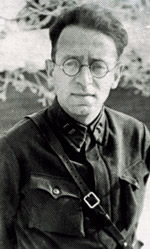presents:
Soviet Writers at War!
IN THE MAIN LINE OF ATTACK
by
Vasili Grossman

presents:
Soviet Writers at War!
IN THE MAIN LINE OF ATTACK
by
Vasili Grossman

|
During the Great Patriotic War, Vasili Grossman was a correspondent for the army newspaper Krasnaya Zvezda. As such, he was an eye-witness to and participant in the historic Battle of Stalingrad. Years later, in his novels For A Just Cause and Life and Fate, Grossman would present a somewhat controversial view of that battle. But in 1942, his views were less ambiguous, celebrating the unquestionable courage of Soviet troops and highlighting the horrors of this hideous war. In the Main Line of Attack describes life and death in a division of Siberian troops who had to bear the brunt of the most frenzied period of Nazi attacks on Stalingrad, withstanding 80 straight hours of bombardment, and more. |
|
Soviet Writers at War! see also: Biography of Vasili Grossman |
